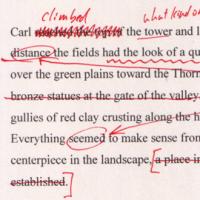Tips for Writing a First (or Second or Third) Draft

“The men stare at her as if she has just addressed them without using vowels ...” I love this creative description from Fredrik Backman’s delightful novel Britt-Marie Was Here. I’m willing to bet that clever passages like this one—and the book is full of them—didn’t emerge full-blown in writing his first draft.
Many people become discouraged about writing because they falsely believe that the initial draft has to be brilliant. Actually, it doesn’t even have to make sense. The first draft is simply raw data, and you’ll progress faster if you write it quickly so that you get as many ideas out as possible. It’s the subsequent rework that turns the first draft (and sometimes second and third and fourth drafts) into a finished product. This is true whether you’re writing for personal or professional purposes, fiction or nonfiction, a one-pager or an entire book.
If you get stuck as you’re writing, rest assured you’re not alone. Instead of beating yourself up, take a break and do something else. For that matter, take a break even if you don’t get stuck. Somehow, your mind continues to work on your writing even when you’re not actively doing it. When you take time away from your writing—especially if you can put it away overnight—you’ll bring fresh eyes and an energized perspective to it when you return.
To edit your drafts, I strongly suggest you print them out. When your writing spans more than the size of your screen, and especially if it’s numerous pages, you need to see how the paragraphs flow from one to another. You need to be able to examine your terminology to make sure you’ve used it consistently, and to make sure you’ve avoided redundancies, such as using the same example in two places.
A lot of editing, especially with early drafts, revolves around deleting content that doesn’t support what you’re trying to accomplish. Deleting words (and paragraphs and pages) you’ve struggled so hard to capture is not easy. But it’s a necessary part of transforming those messy early drafts into a polished product. In the course of revising this article, I’ve probably deleted as much as now remains. That’s the nature of writing.

